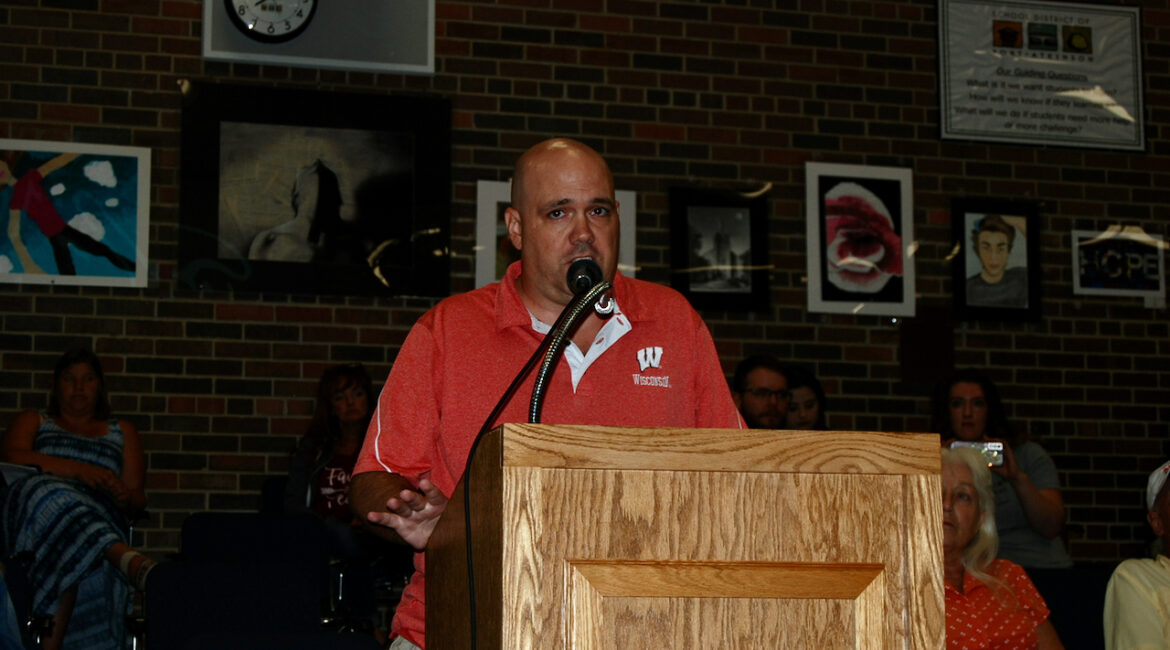By Kim McDarison
The School District of Fort Atkinson Board of Education took no action Monday, leaving in place its decision to remove a mask mandate that was put in place last school year.
The decision to take no action on agenda item “2021-2022 School Opening Plan” during Monday’s special meeting — creating a policy of optional masking in the district’s schools at the beginning of the upcoming school year — came after some 100 district residents, including 16 speakers, expressed their views about masks and district policies that would require their children to wear them.
A majority of those who spoke were against mask policies.
After opting against returning to the former mask mandate, the board noted that it would revisit its policy decision throughout the school year as more information about COVID-19 cases and trends in the area became available. The next opportunity for board members to look at policies will come 12 school days into the new school year on Sept. 17, which is when the board has its next regularly scheduled monthly meeting.
Masks required on school transportation
The board approved an action, adhering to federal policy as outlined by the Center for Disease Control and Prevention (CDC), to require masks on district-funded public transportation. During the meeting, School District of Fort Atkinson Superintendent of Schools Rob Abbott explained that federal funding could be withheld from the district as a consequence of neglecting to adhere to the regulation.
The board also approved the removal of a COVID-19 addendum earlier added to the district’s Employee Handbook.
During the two-hour meeting, speaking remotely and appearing on a large screen for the audience to see, Jefferson County epidemiologist Samroz Jakvani offered some COVID-19 statistics from across the county and the school district, which provided a snapshot of COVID cases reported in August and the previous seven days. (Statistics delivered by Jakvani will be provided in a separate and upcoming story.)
In his “2021-2022 Opening Plan Report,” Abbott shared a slide presentation about policies enacted by the board last year and offered recommendations and options that could be included within a school opening plan for the upcoming school year.
Both Jakvani and Abbott were periodically interrupted by audience members during their presentations. Audience members shouted out comments and questions, and became agitated when school board president Mark Chaney announced that questions for Jakvani would come exclusively from board members.
At several points during the meeting, Chaney told those in attendance that he would adjourn the meeting if a level of civility could not be maintained.
Changes in protocols
During his presentation, Abbott noted that some of the upcoming year’s “school experience” would look different from last year. Among changes students and staff could expect, he said, were a return to in-person learning and regular classroom procedures, including students working in small groups with shared materials; a return to in-person school events; a removal of plastic barriers; a return to typical lunch procedures; the buildings would allow some visitors, and a return to field trips.
Additionally, he said, the district would participate in COVID-19 contact tracing through the Jefferson County Health Department, and quarantines would be related to “household positives,” with those living in households with reported positives asked to stay home for a duration of time which would be decided based on individual circumstances.
Looking to clear up some of what he termed “misinformation,” which was circulating within the district, Abbott said families continue to have the freedom to decide if their child receives a COVID-19 vaccination, in-person learning will continue for the duration of the school year, the district will provide equal opportunities for its students regardless of their vaccination status, students will have opportunity to enjoy social interactions such as dances, school trips and extracurricular activities without restrictions, and only voluntary COVID testing would be requested by schools.
Abbott enumerated what he described as “best practices” for students and staff relating to communicable diseases. They included: staying home when a person shows signs of sickness or symptoms, consideration of wearing a mask, symptom tracking, increased hand washing and sanitizing, enhanced cleaning and ventilation, practicing spacial awareness and physical spacing, increased parent/educator communication, and visual reminders of best practices.
As an option for the upcoming school year, Abbott proposed what he called “optional enhancements,” which might, with board approval, include a requirement for face coverings in school, with an allowance for removing them under certain circumstances, including when a person is outdoors, eating or drinking, and for staff and adults, when no students are present.
He also proposed that the board consider applying mitigating strategies by group, with one such group including all students and all staff. A second group was defined to include pre-K through eighth-grade students and staff.
Public comments
After the presentations, the board opened the meeting for public comments, extending its total comment period from 30 minutes to 45 minutes to accommodate the full list of speakers. Each speaker was allotted three minutes to speak.
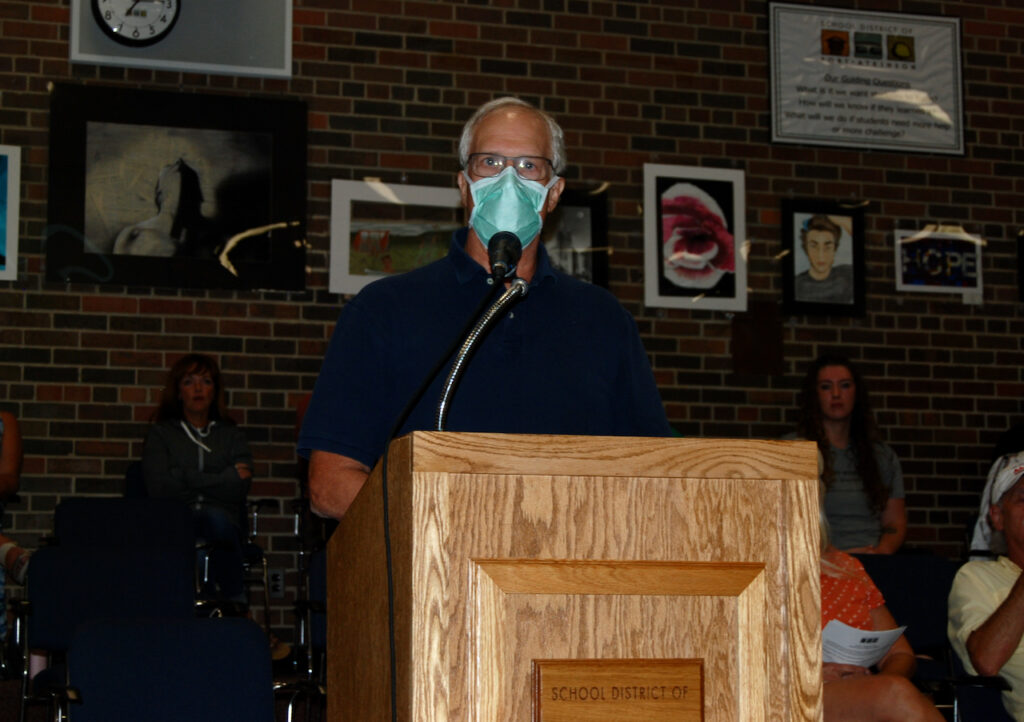
Donald Williams, pictured above, identifying himself as a physician, said much of his time was spent treating everyday anomalies such as infections and broken arms, but, he said, “what I’ve really spent most of my career doing is stacking the deck in favor of people living healthier lives.” With COVID and children, he said, the question is: “How can I stack the deck in favor of our children being healthy and remaining healthy?
“We know from the experience of the last year and from research studies that masks work.”
Williams said those wearing masks are less likely to spread particles carrying disease.
With the Delta variant, he said, “people shed a thousand times more virus particles than the earlier strain of COVID.
“I have practiced my whole career by the principles of the Golden Rule, meaning that I want to do for others what I’d like them to do for me. And I think the idea of masks is a good example of that. I would like to not infect any of you and I would not like any of you to infect me. Based on my age and my high blood pressure, I’m one of those persons who is at high risk,” Williams said, adding, the loss of life to COVID, and the loss of a child to COVID, would be an “unbelievable tragedy.”
“I think the mask mandate makes sense to protect our children,” he added.
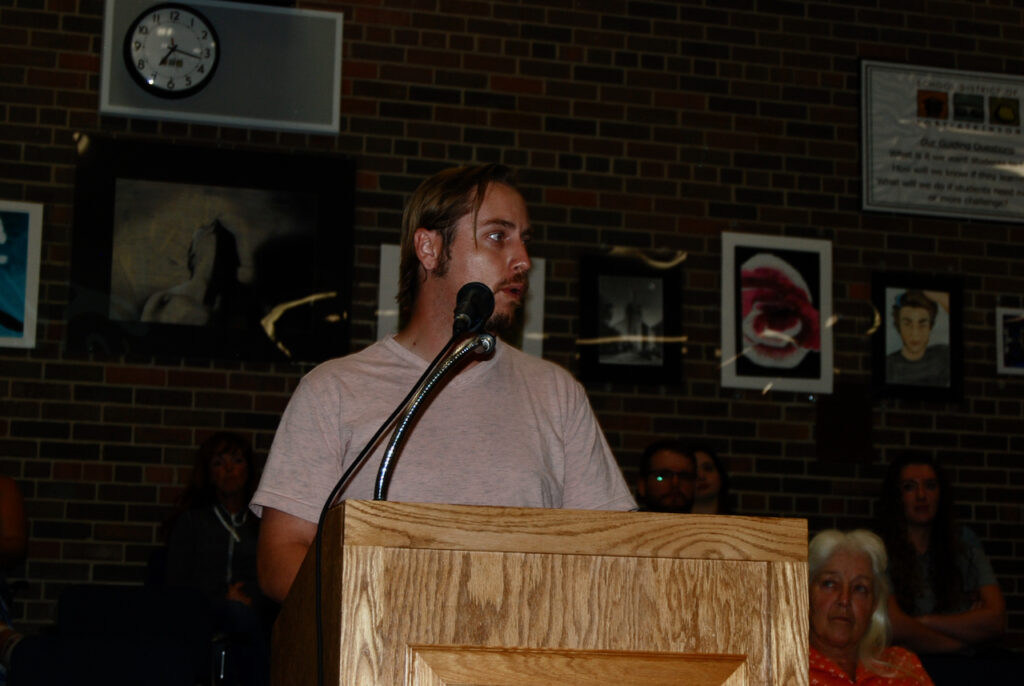
Zachariah Lange, pictured above, said he has been a resident of Fort Atkinson for 30 years. He grew up in the community, and later, he and his wife returned to the community to raise their son.
Addressing the board, Lange said: “I value my rights, my privacy and my right to liberty — liberty being the state of the people to act and speak freely.
“Our first president, George Washington, said our liberty can never be safe but in the hands of the people themselves,” Lange added. He defined privacy rights as the “right to be left alone.”
Turning his attention to masks, he said, “I see these proposed requirements as a direct route to removing access and public services from certain members of the community. Some intentionally and others not. These impositions threaten our liberty. They seek to remove our right to self-determination.
“To be clear, I acknowledge that there are consequences to the choices to be made tonight. The world is a dangerous place, and every choice we make has consequences, both good and bad.”
Ultimately, he said, in his view, it was a parent’s place to make choices for their children.
As parents making choices, he said, “It is not required that we satisfy anyone with an explanation.” Addressing the school board, he said, “Your duty is to ensure the services we pay for are accessible to all of us.
“It is an easy choice to support choice. It excludes nobody from options available to us as members of the community, and that’s how I would implore you to vote. I will not wear a mask. I will not allow my son to be forced into wearing a mask through intimidation, isolation or peer pressure. We owe nobody an explanation why it is the right choice for us.”
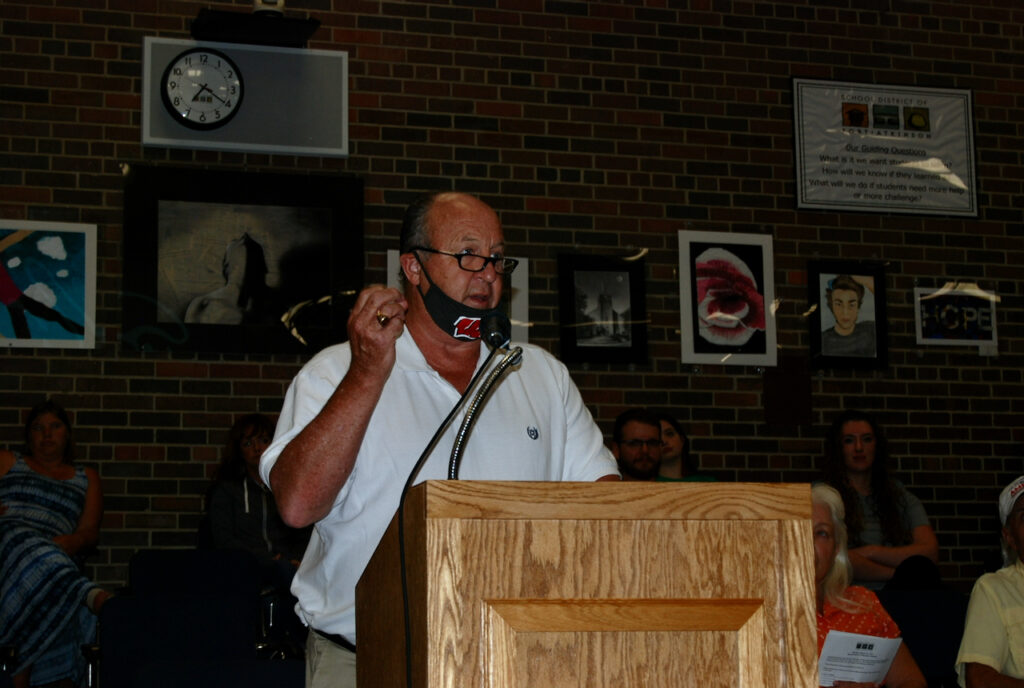
Serving as the district’s superintendent from 1999 to 2013, James Fitzpatrick, pictured above, praised the district, noting: “This is a great school district. We’ve got great teachers, we’ve got great school leaders, administrators, We’ve got the best kids and we’ve got wonderful families who’ve always supported the school district in making it one of the beacon districts in this state.”
Fitzpatrick enumerated three premises, upon which, he said, he believed those in the room could agree. They were “open, face-to-face” learning, schools that were open and stayed open, and a successful defeat of COVID.
“If there is no masking and other reasonable mitigations and strategies, then what is the process to reacting to positive cases? We could have some pretty large outbreaks, as the Delta variant is twice as contagious as the previous variant. This would keep a fair amount of students and staff out of our schools, in isolation or quarantined, not to mention a hospital or, God forbid, worse,” he said.
“Masking certainly isn’t a perfect strategy,” he continued, “but layered with other strategies, it becomes a multi-layered strategy that can avoid the spread. The best protection, of course, is vaccination,” he said, adding, “I can’t stress enough to staff and students, if you’re eligible for the vaccine, get the vaccine and start now, because full protection doesn’t come until two weeks after the second dose. Additionally, I don’t like making this argument, but from the liability side, when all the experts recommend one thing and you do another, you have to wonder what the liability there might be for a bad outcome.”
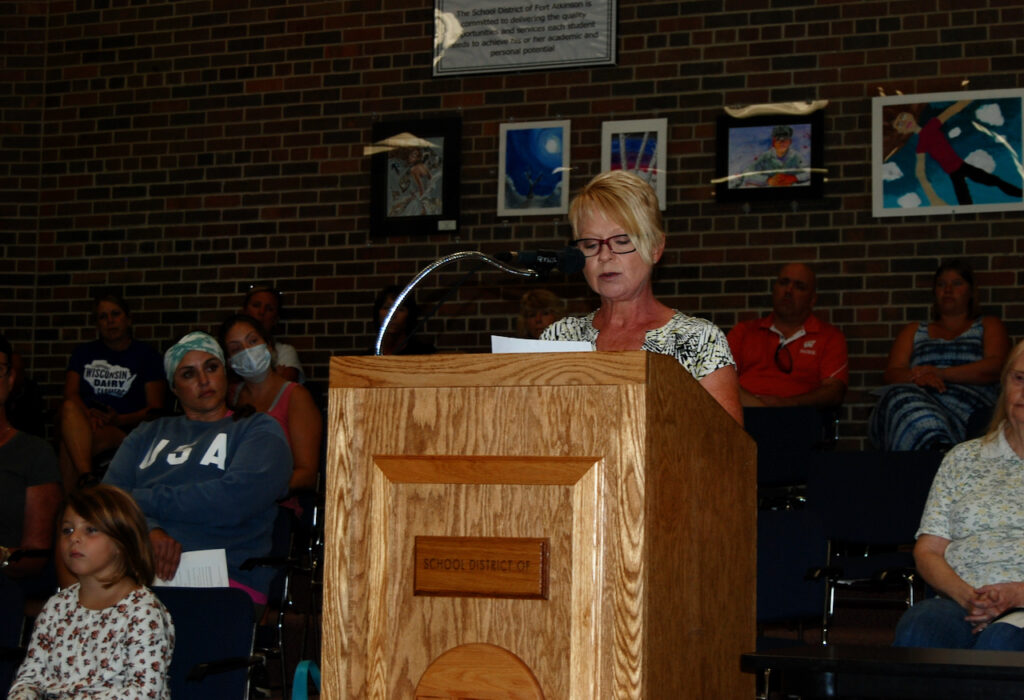
Amy Larson, pictured above, said she was the mother of two children in the district, but she had also been asked to address the board on behalf of a group called Fort Atkinson Parents for Choice.
Larson presented the board with a petition, which, she said, carried 370 signatures from “concerned parents and Fort Atkinson taxpayers.”
Reading from the petition, Larson said those who signed were requesting: the freedom to choose if their children would wear a mask or receive a COVID-19 vaccination, in-person learning for the duration of the school year, equal opportunities for their children regardless of vaccination status, opportunities to enjoy social interactions at school such as dances, trips and extracurricular activities without restrictions, and that any COVID testing at school would be voluntary only.
Offering a personal statement, Larson said: “I am not an anti-masker or anti-vaxxer. I stand for choice.”
She cited photos within materials presented to the board of students, staff and administrators gathering in school buildings over the summer without masks and, she said, she was aware of photographs of area families participating without masks in large celebrations and sporting events.
“That was your choice. Here’s where the problem lies for me. For you to make that decision to send my child back to school, and you decide that they mask, socially distance, put them behind plexiglas barriers, to me, is hypocritical, and with all due respect, an abuse of your power. What kind of message is that giving our kids? Rules for thee and not for me,” she said.
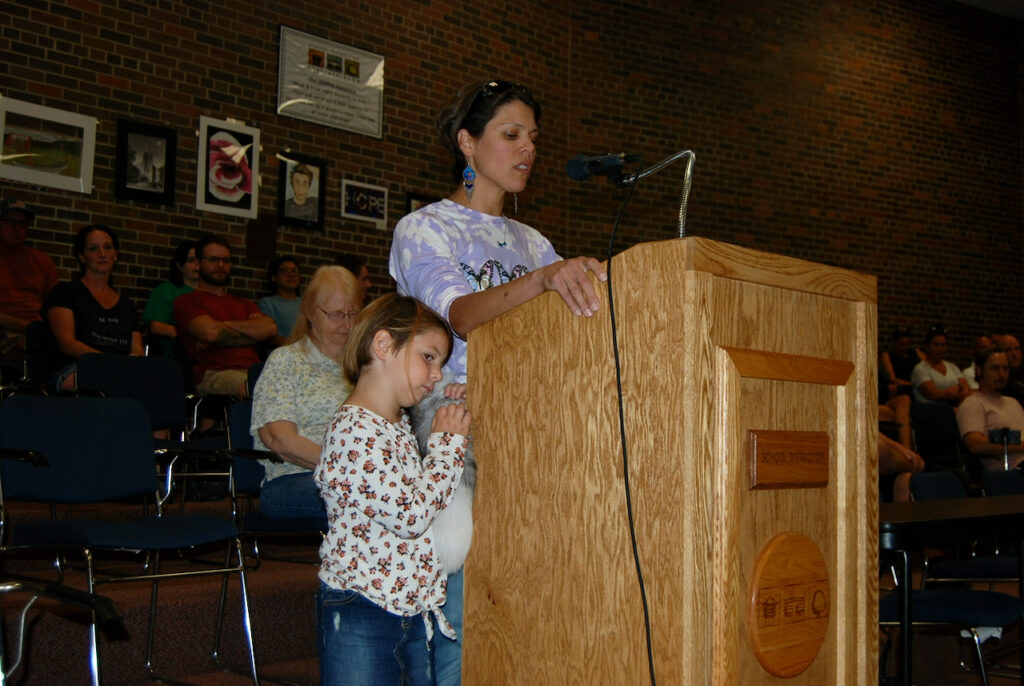
Addressing the board, Rebecca Van Ess, pictured above, cited passages from scripture, saying: “Heavenly father, thank you for the fullness to speak your truth. Holy Spirit, I open the door and invite you to come in and fill this place with your holy presence, because your word says we’re in the spirit of the lord as there is freedom.
“The truth is we’re not fighting against a virus, we’re battling against the Kingdom of Darkness, the father of lies … and child sacrifice. This war is taking place in the hearts and minds of people. It’s an information war, and the information you choose to believe will determine what side you’re on.
“Voting for mandatory masks and vaccinations is a choice to stand in agreement with lies and tyranny. God’s word tells us that truth sets the captives free,” Van Ess said, adding: “I feel obligated to give you guys a warning from God’s word, in Luke, Chapter 17, Verse 2, it says: It would be better to be thrown into the sea with a millstone hung around your neck than to cause one of these little ones to stumble and fall into sin. Which is exactly what has happened. God has been removed from our schools and our children have been led astray. Prior to this moment, you may have been able to claim ignorance, but now you know. I have clearly pointed out the violation of God’s law and you have no excuse.”
She announced her intention to run for school board.
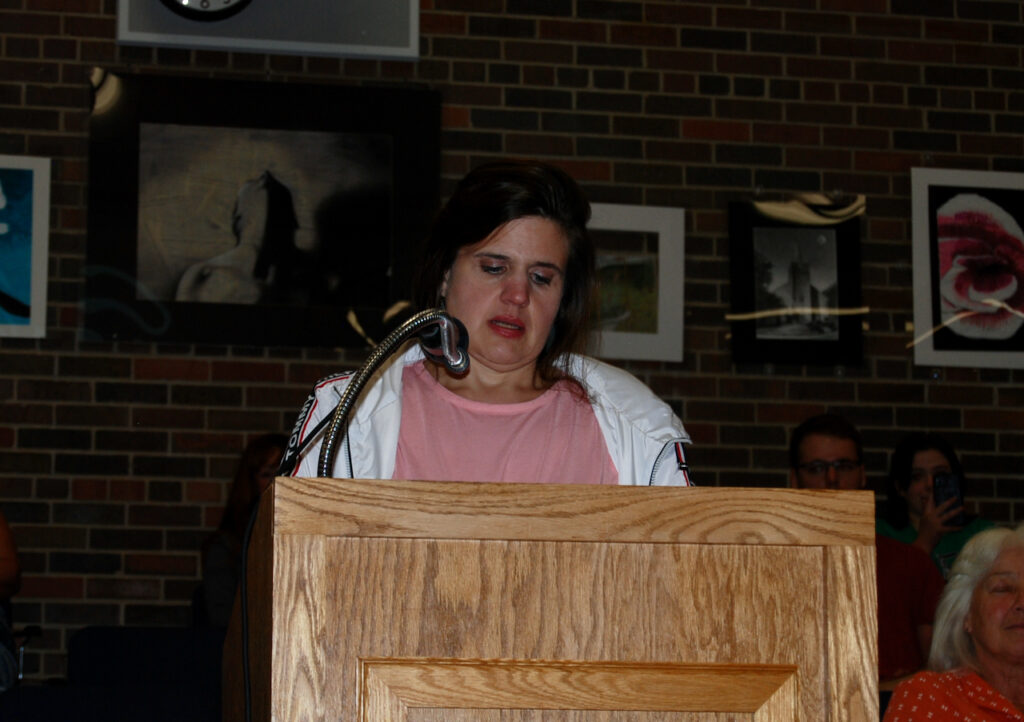
Masie Allie, pictured above, expressed her affection for the district, sharing with the board that both of her parents were district teachers. She stressed the importance of critical thinking, saying: “I’m here tonight to ask some questions. My husband and I have three kids in the district. I’m here, this evening as their mother to advocate for them. My daughter, who is here tonight with me, complains of breathlessness and anxiety when masked. My youngest son got reoccured rashes from wearing masks, even with my most diligent efforts, cleaning them daily.”
While there were concerns about his appearance, she said, “I am much more worried about the organisms growing on these cloth masks — that are worn for eight hours a day, five days a week — than a virus with a 99.98 percent survival rate in children. On to my questions: What are my children’s alternative options if they cannot mask? What is the process for applying for voucher money if we need a plan B? If this is really about the safety of our children, why were these masks not mandated for influenza, which killed twice as many children? Why is there not more focus on the second pandemic — the mental health crisis that our kids are now suffering? I teach my children autonomy. They govern their own body. No-one else does.
“As a mother,” she said, “I can no longer go along in good conscience with these mandates.”
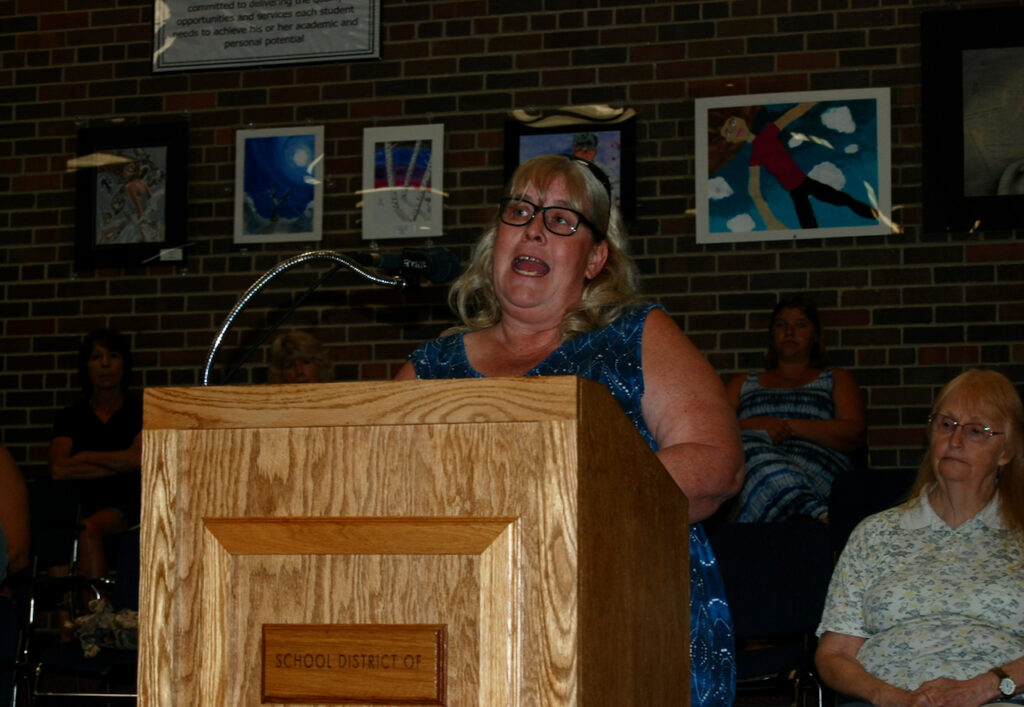
A graduate of Fort Atkinson High School, Ellen Narkis, pictured above, said, over the course of the last 20 years, she has had at least one of three children enrolled in the district.
While she didn’t always agree with the decisions made by the school board, Narkis said she did believe that the board was doing what it thought was best, and compared to her own beliefs, “nothing was that adverse.”
“We’ve come to a different point now and it started last year,” she said.
Narkis said early last school year the district was engaged in similar discussion at which time the Jefferson County epidemiologist was offering COVID-19 protocols. According to Narkis, the epidemiologist talked about closing schools down due to positivity rates.
“This is why I started getting involved, watching the school board meetings, emailing board members and such, about live schooling,” she said, adding that in time, the board revisited the protocols, opting to return to in-person learning.
“We would not have been opened at all last year had we followed that guidance from the health department. We heard a year ago how everybody was going to die,” but, she said, “this (COVID) doesn’t affect kids the same … we know our kids are relatively safe.”
“With all due respect,” Narkis said, “It’s not your job to protect the community. I appreciate the fact that you want to, but your job is to prioritize our children.”
She asked the board to allow decisions about masks to be made by parents.
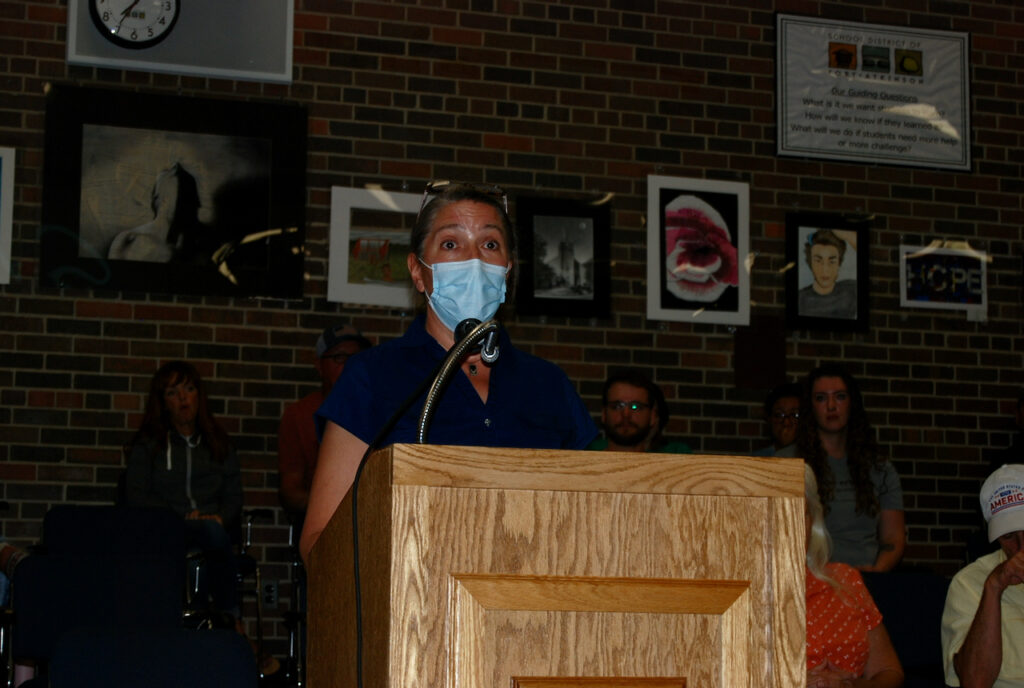
“I’ve been a family medicine doctor in Fort Atkinson for 19 years,” Shauna Meyer, pictured above, said, adding that she and her husband have a high-school-aged student who has attended district schools since preschool.
Said Meyer: “I’d like to thank Dr. Abbott and the board for their ongoing dedication, and the safety and fine education of our students, which has been particularly challenging during the COVID pandemic. I think we do all agree that in-person learning is best for a majority of students and a majority of families, and we can all agree that a safe environment improves learning.
“Masks are a nuisance and we are tired and want to stop wearing them. But unfortunately, the data show the pandemic’s not over. And schools that have opened in areas to our south without mask mandates are now quarantining students and staff and many of them are reverting to remote learning, which is not where we want to go.”
Meyer said COVID-19 cases and hospitalizations are rising again in Wisconsin. Nationally, she said, “we have the highest pediatric hospitalization rate due to COVID-19 since the pandemic began. No-one wants to see our kids in the hospital. Vaccinations — our best hope of curbing the pandemic — haven’t reached our community in high enough levels to protect us from the COVID harms.
“We’re all tired of COVID,” she continued, “but as a doctor, I can’t stop advocating for the health and safety of our students and our community, and as the school district leadership, neither can you.
“Our experts in health, including the CDC, the American Academy of Pediatrics, (and) the Department of Health, have published clear guidelines on how to open to in-person safely. Universal masking, social distancing, testing with appropriate quarantine are the pillars of those policies,” Meyer said.
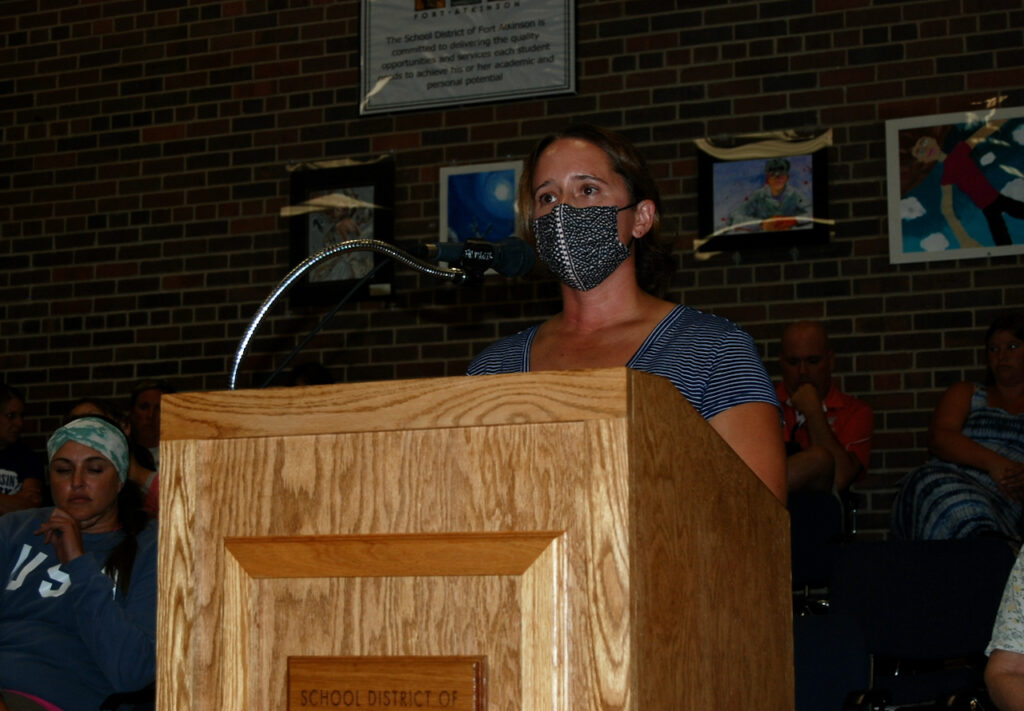
As a Fort Atkinson area pediatrician, Julia Dewey, pictured above, said: “There are probably very few people in this room who have spent time in a pediatric intensive care unit, who have put a breathing tube down a child’s trachea to help them breathe. It’s not pretty.
“Everybody keeps bringing up the mortality rate, which is disgusting to use as a benchmark in the first place.”
Dewey described measures taken when children become ill with COVID.
“They can spend weeks in a pediatric intensive care unit, ventilated, for weeks, which does longterm damage to their lungs. They get hooked on opioid medications because they have to be sedated the whole time, so that then, when they’re extubated, when the tube is taken out from their trachea so they can breathe on their own again, they have to be weaned off the opioid medication over time. They have an addiction because of that, and then they miss school, their parents have PTSD from spending a month in the ICU; the child has PTSD from spending a month in the ICU with a bunch of tubes and lines stuck in them. Their parents miss work — there’s billions of dollars that are spent or lost in our economy as the parents take leave for their sick children. These are all things that I think people need to take into account,” she said.
Dewey said people needed to focus more on the science and less on their feelings.
“There is science and evidence coming out of the states that have already opened up without masks. There’s evidence just pouring out of those states right now that children are getting sicker and sicker, and maybe they’re not dying, and that’s great, but they are getting sick, and they’re being hospitalized. I would hope that all of our goals are the same here and we want to keep children healthy, we want to keep them safe, we want them to be happy, we want them to thrive in adulthood, and that’s the reason why we put them in carseats when they are babies, that’s the reason why we try to make them eat their vegetables, that’s the reason why we do all these things, to try and help kids be healthy.”
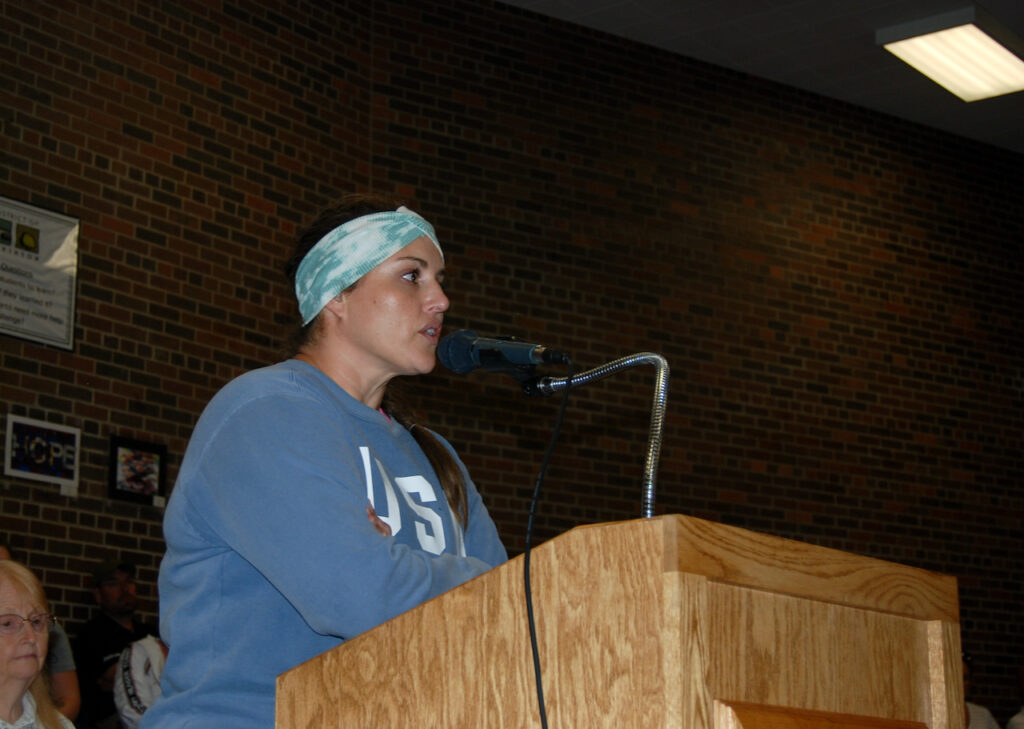
Sarah Jones, pictured above, who said she was the mother of a student attending Purdy Elementary School, noted her reason for attending Monday’s meeting was to advocate for choice.
“As Americans, we are blessed to live in a country that allows us the freedom to live our lives how we see fit. This freedom should also give us the power to choose whether or not we mask our children. Children are being muzzled, and if we continue to require or force masks on our children, we continue to promote a future where our children have no rights, no choices, and are made to believe that their feelings, their wants, their ideas and their voices have no place in society. That is not setting our community or our society up for success.
“I’ve seen members of this community, some of you here right now, out and about, enjoying your summer, mask-free, not practicing social distancing, living your life free to make choices, and now, in one week, some of you want to change that. If you want to do that for your child, I support you, but let me choose to do what’s right for my child. It can be both: freedom for you and freedom for me,” Jones said.
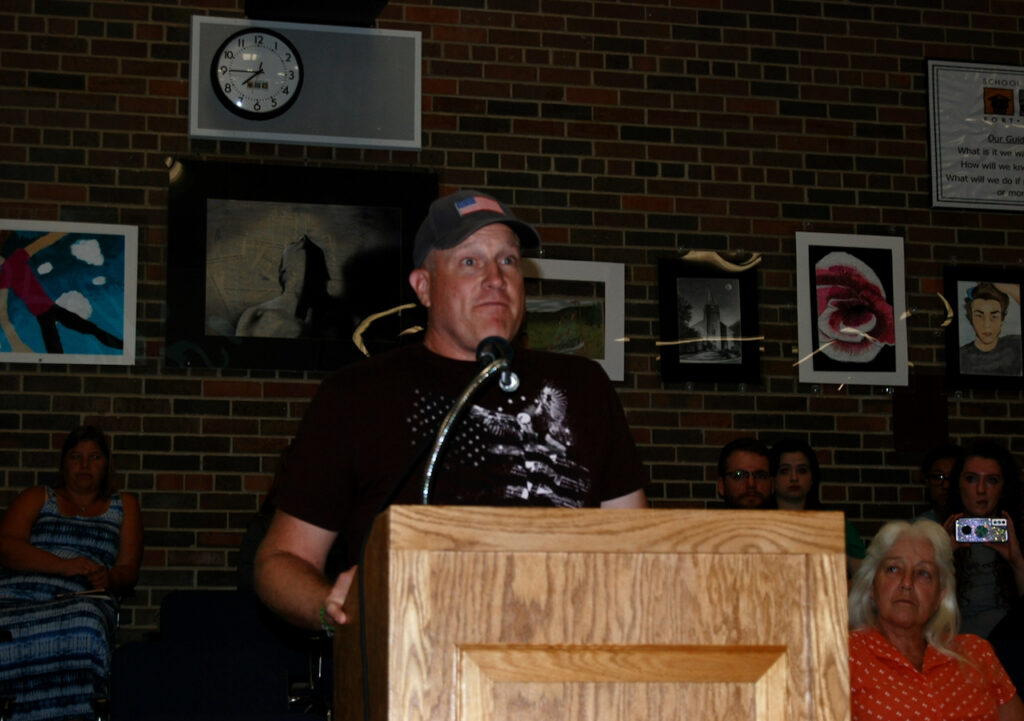
Calling himself “a fool for Jesus Christ,” Matthew Tooke, pictured above, said: “I’ve often been called not following the science when I believe in things like the power of prayer. I believe that Jesus Christ can lift people off addictions, he can change people’s lives, I’ve seen it in my life, and I’ve seen it in others.
“Now I stand here today as a fool for Christ, believing in things that science can’t measure. We’ve talked a lot about science today, and I want to talk a little bit of numbers. In the 1819 flu season, 480 children died of the flu. The flu is more deadly to children than COVID-19, Tooke said, adding that he’d looked at some events, that, he suggested, “have about the same probability of dying of COVID-19 for a child.
“According to the National Weather Service, 49 people are killed from lightning strikes in the United States in an average year. Thirty-three people are involved in unprovoked shark attacks.
“What if I, as a parent, kept my kid inside on every cloudy day or I put them in a shark cage when they went out swimming. You’d call that child abuse.”
Tooke said he believed masks might be effective in capturing large water droplets, but not for those that are aerosol.
“It’s for coughing and particulates that come out in a sneeze, but when you’re in a room for 15 minutes in an environment, a mask does not help.”
Further, he said, “I want to talk about mortality as well … we’ve seen a five-fold rate increase in suicide in our young people in our country.”
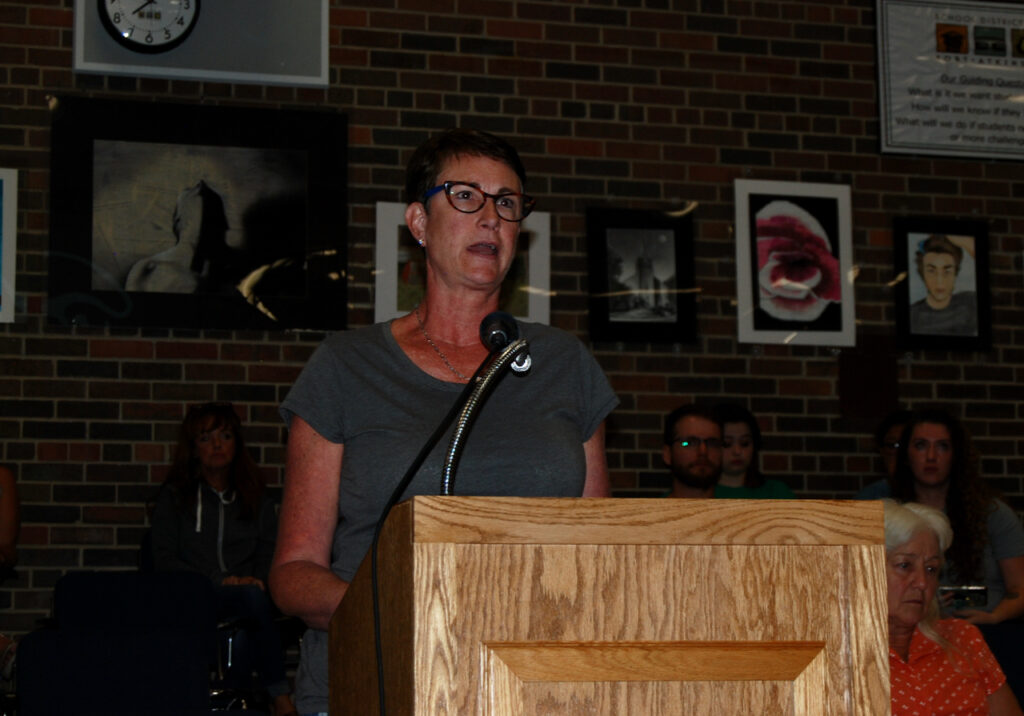
“As you prepare for the new school year,” said Cheryl Costa, pictured above, “I would like you to consider keeping masks optional for students. A successful session of summer school abled both families and staff the freedom to choose to mask or not. It was handled both responsibly and respectfully by everyone who attended. We had students in attendance from all schools in our community and staff worked from all around the area.
“Last school year, our students were required to wear masks for over seven hours for the school day. They had about a 22-minute break to eat their lunch. Some of the students even wore them longer if they rode a bus home, went to after school care or before school care. Students even wore their masks at recess, with me telling them, ‘let’s go out, get some exercise and fresh air.’ Watching them wear their mask was heartbreaking. Why are we masking our healthy children? That decision belongs directly to the parents. It is their responsibility and their choice of how they’d like to keep their child safe.”
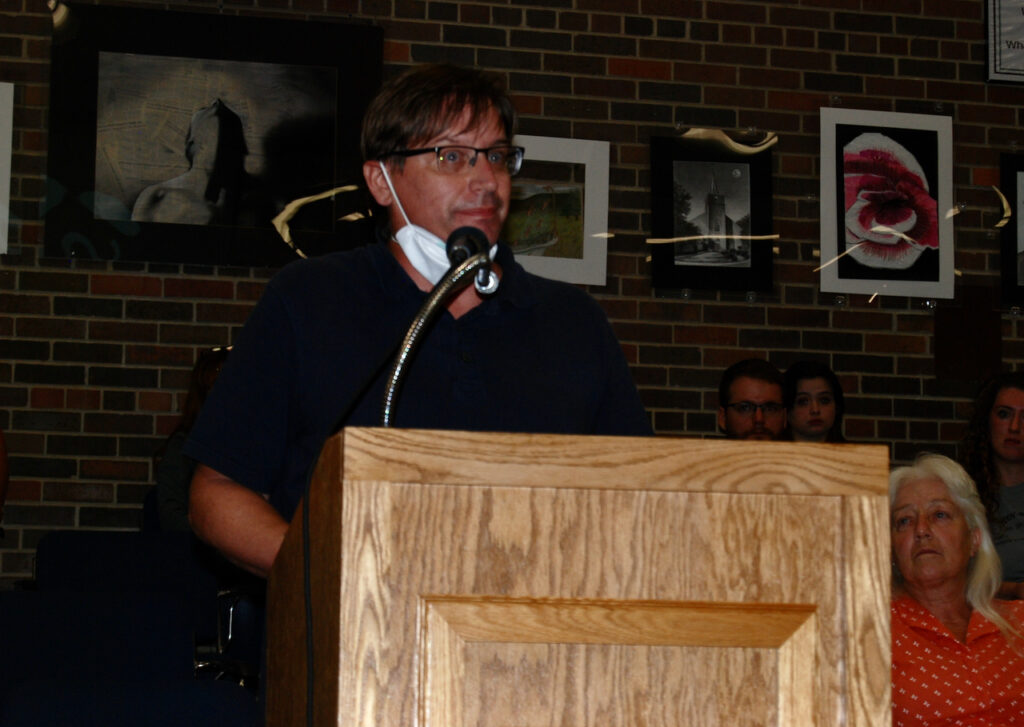
Joshua Knapp, pictured above, talked about his desire to see schools remain open.
“I think we’ve seen in the news recently there have been a few examples of schools going back only to be shut down because of an outbreak. None of us want that. I took the time today to go through the peer-reviewed research mentioned in the CDC report. The consensus is clear: there are three ways to prevent outbreaks that shut schools down: vaccination, social distancing, and masks. And as you go through these peer-reviewed scientific journals, there are many examples where they cite that children are vectors to each other, to their parents, to their grandparents, to the community, and that masks drastically reduce that risk.”
He saw a certain irony, he said, when people disregarded the science, noting: “These are the kinds of journals that form and support the basis for what goes into a textbook. These are the kinds of journals that support the foundation of university education, and here we are, in a place of learning, saying that this doesn’t matter. That’s the evidence. If you don’t like the evidence, you’re probably not working in the realm of data.”
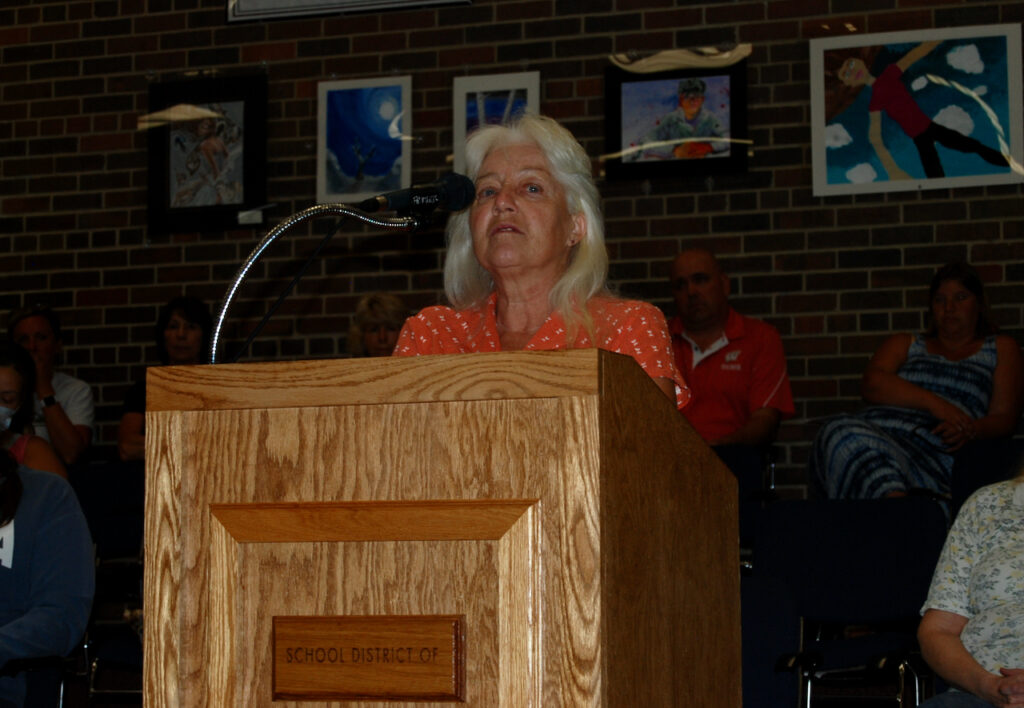
“There’s tens of thousands of scientists, doctors, (and) epidemiologists that have opposing information. All that has been blocked,” said Carie Kendrick, pictured above.
“Logic dictates that wearing a mask for any amount of time causes oxygen deprivation, which would cause your immune system to be diminished for children. The pediatricians are telling you they are getting very sick, they have to be intubated. Stress is also a factor that attacks your immune system. Can you imagine being in a classroom, being muzzled like that?” Kendrick asked.
She suggested medical information being shared by the district and others was “very skewed.”
“I’m sorry, we are not ignorant. We are seeing that you are trying to control the narrative. The man that was on the screen, did he tell us how many of those people had co-morbidities, had terrible diabetes, blood pressure, multiple diseases, and they are very unhealthy individuals? I have myself, very few times in my life ever had health insurance. I have managed to get through everything using garlic, herbs, we have all these things that God gave us. We have a choice. This is the United States of America and I’m not against you wearing a mask. You have no right to mandate for us or small children, it is an abuse,” she said.
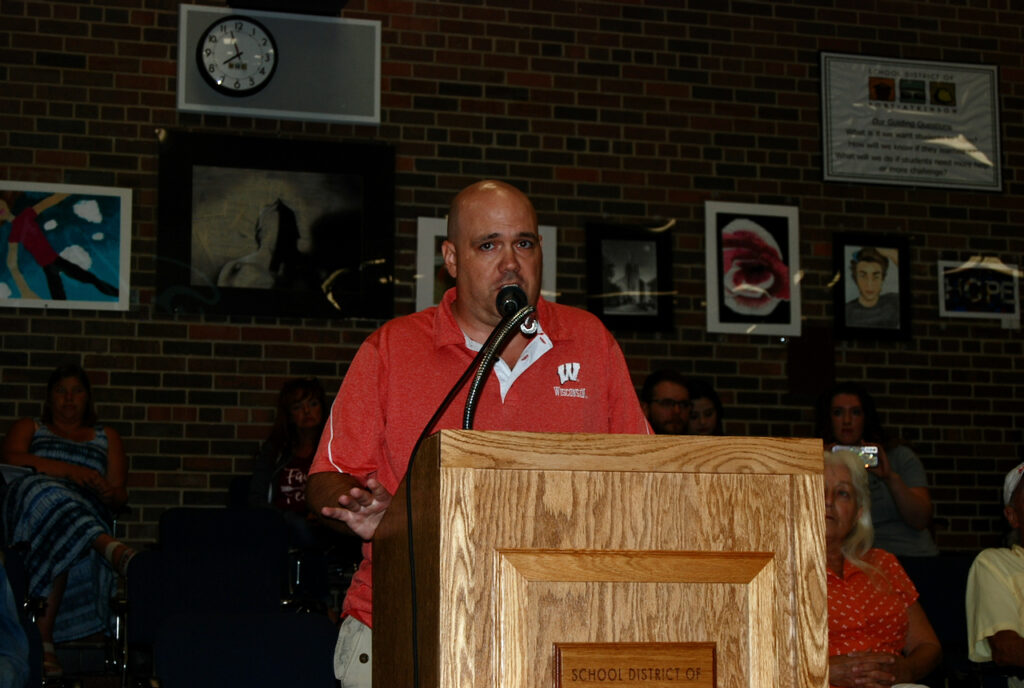
“I have listened to the arguments. I’ve noted that they are missing a few things. Namely evidence, data, science, common sense and basic human decency, said Jeff Patton, pictured above and a father of five.
Addressing the school board, he said: “You’ve presented no facts at all so let me do that now. COVID poses almost no threat or risk to our kids; 4.2 million children have tested positive for COVID and a total of .008% of them have died. What about the flu? More kids have died from the flu than COVID. Now did anyone on this board at any point in time ever suggest that kids wear masks for the flu?”
Patton asked: “Do any of you know the psychological damage we do to children by forcing them to cover their faces, teaching them that the air is toxic and that everyone around them is sick? Have you ever wondered about the health effects of forcing kids to breathe through sweat, and spit, and dirt-soaked rags every single day? What about learning to read when they can’t see the teacher annunciating the words? Or seeing the facial expressions of their classmates? What does it do to a developing child’s immune system to wear a mask every single day? You know what it’s called when you force kids to wear masks for fear of a virus that poses almost no threat to them? It’s called child abuse.”
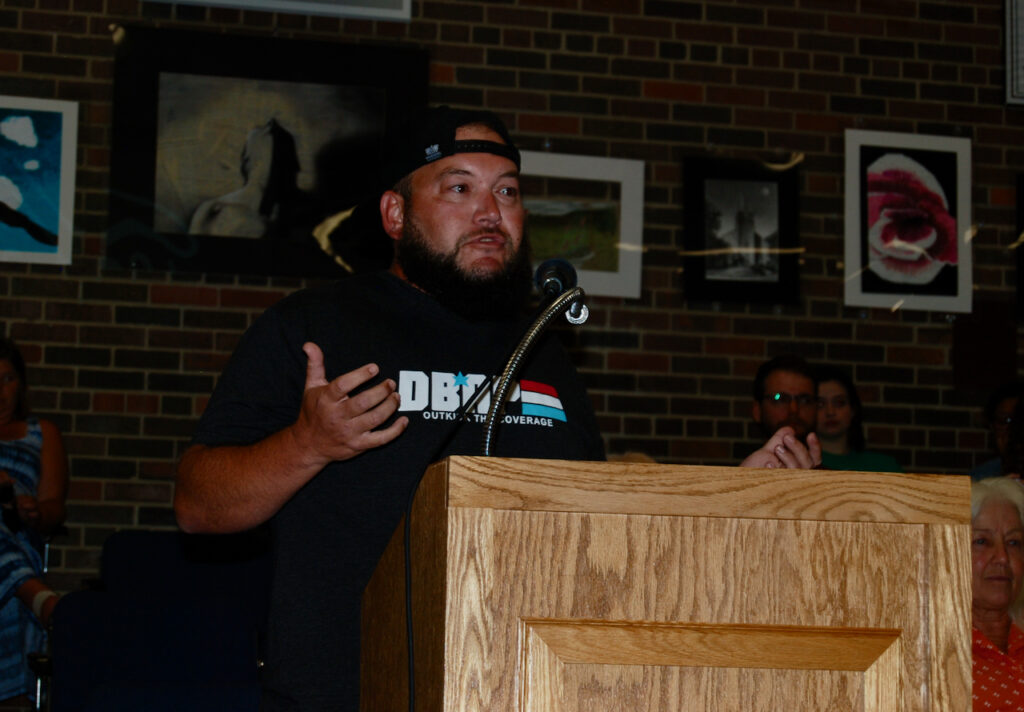
Dale Prisk, pictured above and a father of three, asked: “Who do you all in this room think knows our kids the best?
“Every single parent in this room can tell you something today about their kid that nobody sitting in front of me can. And it breaks my heart to think that I have to sit quiet and listen to people bark orders and tell us what’s best for everybody when we spent a year bending over backwards agreeing with masking that we did not agree with.
“I just want to know: “Where’s the compromise for the parents last year? I didn’t think it was a good idea to have my masks on my second- and first-year-old kids, If somebody can explain to me why they need it on at recess, I’m all ears.
“I’m trying to keep myself calm, but you know what makes people upset? Transparency. And when you march out the person in Jefferson County to BS everybody with inflated stats, and scare us, and use charts that are inflated to 100,000 case numbers to make things look bad, it doesn’t sit well. When people don’t get a chance to actually ask questions and get answers, they’re just told to be quiet and move on, that’s what makes people mad.”
Prisk questioned numbers shared by Jakvani in his presentation, saying: “When we talk about spikes, let’s be realistic, we’re talking about four cases and eight cases — eight cases to 16 cases — we just heard there’s 86,000 people in the county. Does that seem like a big number to anybody else? I’m not a doctor, and there are people here, way, way, way, way smarter than I am in this audience, for sure, but, I’ll put my parenting up against anybody in this room. And one thing I’m not going to do is sit by and let people tell me what’s best for my kids so it can protect them to feel like they are doing the right thing.
“Beyond that,” Prisk said, “I’d like to say everyone on the board does a great job, and it’s not a personal attack. I constantly believe that everybody sitting in front of me is doing things that they believe is right and we need to be respectful to them, but I think the compromise should be as clear as day: If you think masks are best for your kids, send them in a mask. If you don’t think it’s best, send them without one. Everybody gets along and let’s focus on what’s important. It’s not people’s feelings, it’s our kids’ education.”
Board comments
After hearing public comments, several board members addressed the audience, expressing their views.
Said board member Amy Reynolds: “It is a very, very, very tough decision to be up here to think about all of this. It’s not just simply putting something over a child’s face. I’ve been going over this for weeks now.
“We also have to take into consideration the entire student, the entire staff member, not just their face. There is a huge mental aspect to students that sometimes gets put on the back burner and it needs to be brought to the front. Health and safety is always important to have. It’s hard to be put in a situation where we have to say to hundreds of people: ‘do this or don’t do this.’ It’s very stressful on us, but it’s also stressful on parents, it’s also stressful on students, and can cause different things inside a person, whatever age it may be. I don’t think that that is for us to really say. I think it should be more on the parent, I think we need to put more back onto parents to help their children to grow. We do have a lot more students who are having way more anxiety than they should. We also have students that are way more fearful of a lot of things and COVID’s going to be around forever.
“I think it’s up to the parents to decide. When it comes to that kind of health and safety, per student, I think it’s up to the parents.”
Said board member Adam Paul: “This is pretty tough. I don’t think anybody up here takes joy in these types of decisions, having to tell people what to do.”
He described the situation as one where board members, no matter what they decided, could not please everyone.
“We’re kind of up that creek either way,” he said.
Addressing the audience, he said: “You talk about the flu vaccine. I think a lot of people bring that into the equation. I think that’s a decent parallel … at least every year right now parents have the choice to give their kids a flu shot and all parents don’t have that choice (with COVID) yet … it’s supposed to be coming this fall. The one thing I think we can all agree on after the last year is that we all want the schools open and we want kids in the schools.
“In my personal opinion, I think that masks do help to limit the spread of the COVID virus. You may disagree with me on that.
“My goal as a parent and as a school board member is to keep the schools open. I personally feel that there’s a net benefit in the (mask-wearing) directive of keeping our schools open,” but, he said, he advocated a mask mandate for “only as long as we need to, until we see the case rates dropping again. I would propose that we have to re-up that every single month. It’s not something that would be in perpetuity.”
As a teacher in a parochial school in the community, board member Rhona Buchta said, she has worked to stay informed.
“I have done much reading. I also teach these students. Not in the district, of course, but I teach students. Today was our first day of school.
“In the past two years, I have not seen smiles as prevalent as I did today.”
At her school, masks were optional, Buchta said.
She expressed a satisfaction with the attitudes of her returning students, noting that she perceived them to “want to learn.”
“Watching them just be happy to learn is exciting,” she said.
“I am not a medical doctor,” Buchta said, adding, “I believe that I have enough intelligence to read the data and do my best as possible to understand it, to analyze it, but I also want to make sure that I have an informed decision.
“I feel that I cannot get around telling our kids to do something that their parents may not want them to do — Ultimately, I just can’t seem to get past making them wear a mask without their parents’ consent.”
“I have really, really struggled with what we should be doing and what should be going on,” board member Kory Knickrehm said. “This has pained me to the core.
“We all joined the board to advance the school district, which is doing amazing things.”
Knickrehm said any decision made by the board would be in place for the first 12 days of school, after which, the board may find a need to revisit the protocol on Sept. 17, when the next monthly meeting is scheduled.
“At this point, I’m going to go ahead and say that we just really take a look at it, placing masks or no masks on the parents. I think that’s the best thing for everybody. I may come back on Sept. 17 and think completely the opposite. I don’t feel like regardless of what I determine today, I was going to feel good about it, but it’s how we move forward as a community and I think that’s the best option.
“Whatever happens,” he added, “We are all one community — we are all one team.”
An earlier story, offering COVID-19 recommendations made by Jefferson County epidemiologist Samroz Jakvani for K-12 school districts, is here: https://fortatkinsononline.com/county-epidemiologist-announces-interim-covid-19-guidance-for-k-12-schools/.
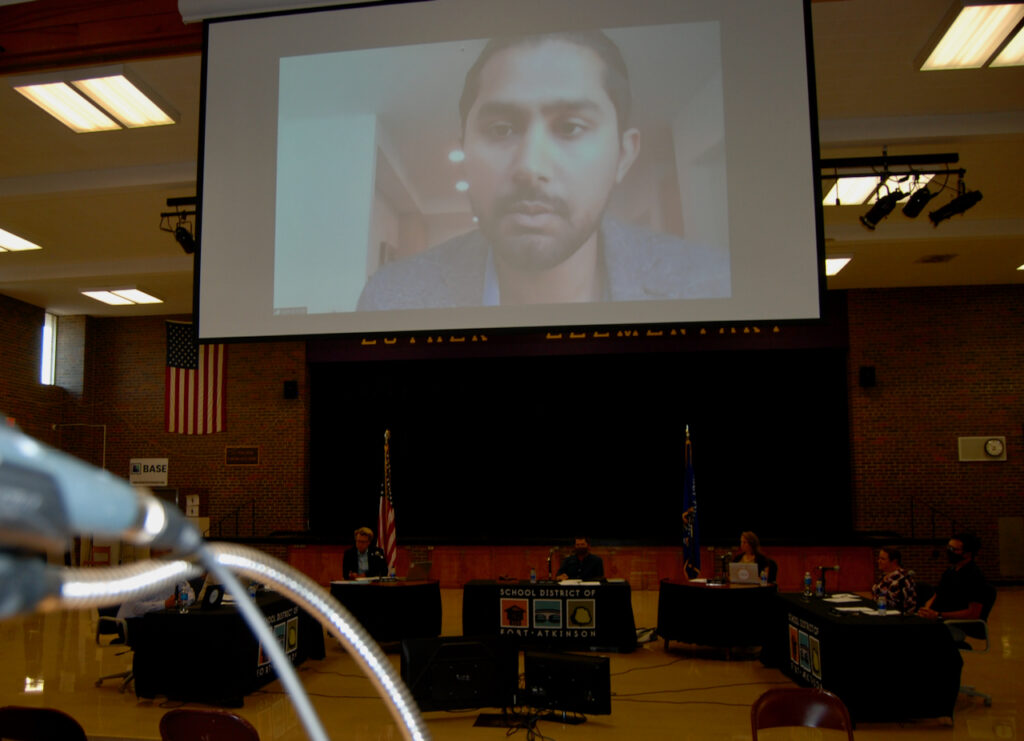
Speaking remotely and appearing on a large screen for the audience to see, Jefferson County epidemiologist Samroz Jakvani offers some COVID-19 statistics from across the county and the school district, providing a snapshot of COVID cases reported in August and the previous seven days.
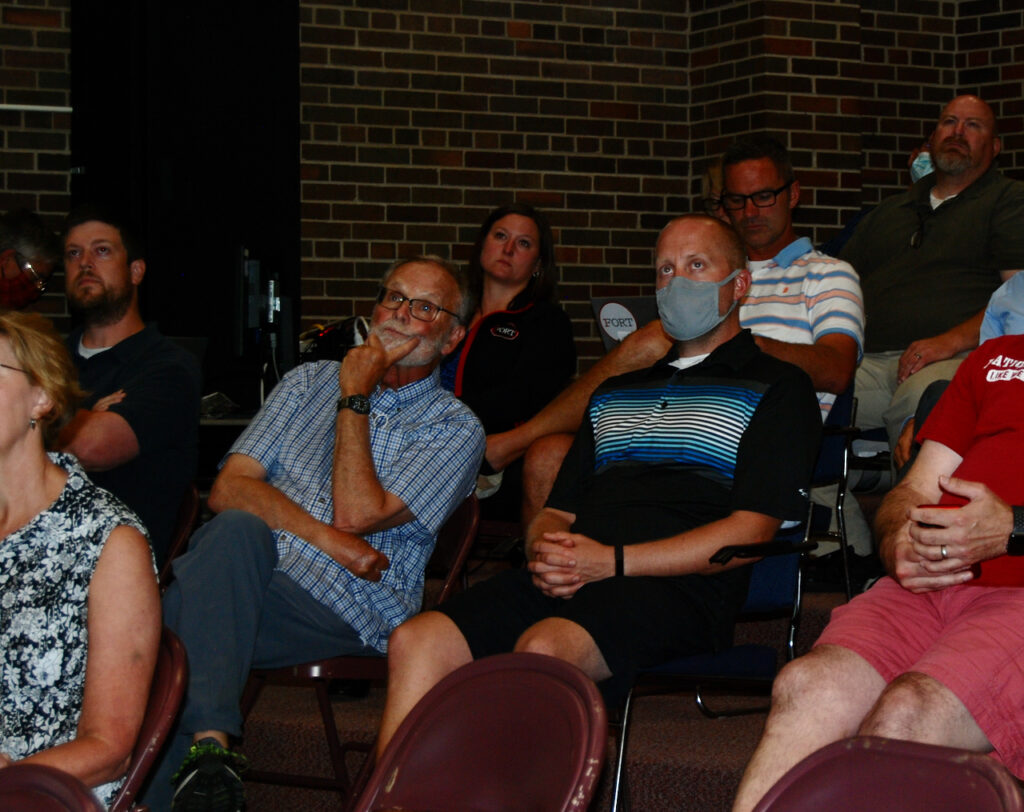
Audience members listen as Jefferson County epidemiologist Samroz Jakvani offers some COVID-19 statistics from across the county and the school district.
Kim McDarison photos.
This post has already been read 4163 times!
